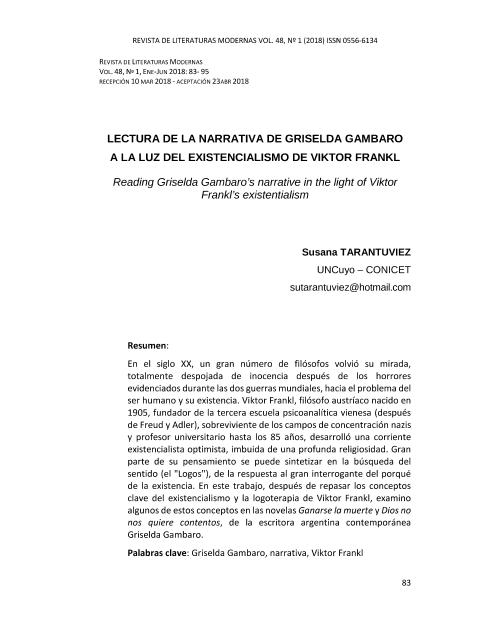Mostrar el registro sencillo del ítem
dc.contributor.author
Tarantuviez, Susana

dc.date.available
2022-11-22T14:28:01Z
dc.date.issued
2018-07
dc.identifier.citation
Tarantuviez, Susana; Lectura de la narrativa de Griselda Gambaro a la luz del existencialismo de Viktor Frankl; Universidad Nacional de Cuyo. Facultad de Filosofía y Letras. Instituto de Lenguas y Literaturas Modernas; Revista de Literaturas Modernas; 48; 1; 7-2018; 83-95
dc.identifier.issn
0556-6134
dc.identifier.uri
http://hdl.handle.net/11336/178533
dc.description.abstract
En el siglo XX, un gran número de filósofos volvió su mirada, totalmente despojada de inocencia después de los horrores evidenciados durante las dos guerras mundiales, hacia el problema del ser humano y su existencia. Viktor Frankl, filósofo austríaco nacido en 1905, fundador de la tercera escuela psicoanalítica vienesa (después de Freud y Adler), sobreviviente de los campos de concentración nazis y profesor universitario hasta los 85 años, desarrolló una corriente existencialista optimista, imbuida de una profunda religiosidad. Gran parte de su pensamiento se puede sintetizar en la búsqueda del sentido (el "Logos"), de la respuesta al gran interrogante del porqué de la existencia. En este trabajo, después de repasar los conceptos clave del existencialismo y la logoterapia de Viktor Frankl, examino algunos de estos conceptos en las novelas Ganarse la muerte y Dios no nos quiere contentos, de la escritora argentina contemporánea Griselda Gambaro.
dc.description.abstract
In the twentieth century, a large number of philosophers turned their eyes, totally stripped of innocence after the horrors evidenced during the First and Second World Wars, towards the problem of human being’s existence. Viktor Frankl, an Austrian philosopher born in 1905, founder of the third Viennese psychoanalytic school (after Freud and Adler), a survivor of the Nazi concentration camps and a university professor up to the age of 85, developed an optimistic existentialist current, imbued with a deep religiosity. Much of his thinking can be synthesized in the search for meaning (the "Logos"), and for the answer to the great question of the why of existence. In this paper, after reviewing the key concepts of Victor Frankl’s existentialism and logotherapy, I examine some of these concepts in the novels Ganarse la muerte and Dios no nos quiere contentos by the contemporary Argentine writer Griselda Gambaro.
dc.format
application/pdf
dc.language.iso
spa
dc.publisher
Universidad Nacional de Cuyo. Facultad de Filosofía y Letras. Instituto de Lenguas y Literaturas Modernas
dc.rights
info:eu-repo/semantics/openAccess
dc.rights.uri
https://creativecommons.org/licenses/by-nc-sa/2.5/ar/
dc.subject
GRISELDA GAMBARO
dc.subject
NARRATIVA
dc.subject
VIKTOR FRANKL
dc.subject.classification
Literaturas Específicas

dc.subject.classification
Lengua y Literatura

dc.subject.classification
HUMANIDADES

dc.title
Lectura de la narrativa de Griselda Gambaro a la luz del existencialismo de Viktor Frankl
dc.title
Reading Griselda Gambaros narrative in the light of Viktor Frankls existentialism
dc.type
info:eu-repo/semantics/article
dc.type
info:ar-repo/semantics/artículo
dc.type
info:eu-repo/semantics/publishedVersion
dc.date.updated
2022-11-02T23:42:18Z
dc.journal.volume
48
dc.journal.number
1
dc.journal.pagination
83-95
dc.journal.pais
Argentina

dc.journal.ciudad
Mendoza
dc.description.fil
Fil: Tarantuviez, Susana. Consejo Nacional de Investigaciones Científicas y Técnicas. Centro Científico Tecnológico Conicet - Mendoza; Argentina. Universidad Nacional de Cuyo. Facultad de Filosofía y Letras; Argentina
dc.journal.title
Revista de Literaturas Modernas
dc.relation.alternativeid
info:eu-repo/semantics/altIdentifier/url/https://bdigital.uncu.edu.ar/app/navegador/?idobjeto=13149
Archivos asociados
